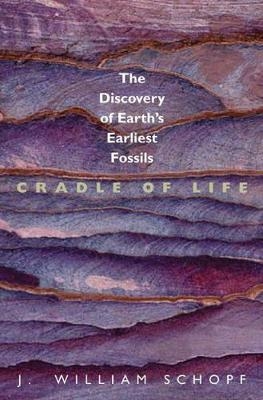
Cradle of Life
Princeton University Press (Verlag)
978-0-691-08864-8 (ISBN)
One of the greatest mysteries in reconstructing the history of life on Earth has been the apparent absence of fossils dating back more than 550 million years. We have long known that fossils of sophisticated marine life-forms existed at the dawn of the Cambrian Period, but until recently scientists had found no traces of Precambrian fossils. The quest to find such traces began in earnest in the mid-1960s and culminated in one dramatic moment in 1993 when William Schopf identified fossilized microorganisms three and a half billion years old. This startling find opened up a vast period of time--some eighty-five percent of Earth's history--to new research and new ideas about life's beginnings. In this book, William Schopf, a pioneer of modern paleobiology, tells for the first time the exciting and fascinating story of the origins and earliest evolution of life and how that story has been unearthed. Gracefully blending his personal story of discovery with the basics needed to understand the astonishing science he describes, Schopf has produced an introduction to paleobiology for the interested reader as well as a primer for beginning students in the field.
He considers such questions as how did primitive bacteria, pond scum, evolve into the complex life-forms found at the beginning of the Cambrian Period? How do scientists identify ancient microbes and what do these tiny creatures tell us about the environment of the early Earth? (And, in a related chapter, Schopf discusses his role in the controversy that swirls around recent claims of fossils in the famed meteorite from Mars.) Like all great teachers, Schopf teaches the non-specialist enough about his subject along the way that we can easily follow his descriptions of the geology, biology, and chemistry behind these discoveries. Anyone interested in the intriguing questions of the origins of life on Earth and how those origins have been discovered will find this story the best place to start.
J.William Schopf is Professor of Paleobiology and Director of the Center for the Study of Evolution and the Origin of Life at UCLA. He is a member of the National Academy of Sciences and the American Philosophical Society, President of the International Society for the Sutdy of the Origins of Life, editor of eight volumes, and discoverer of the oldest records of life on Earth
Prologue xi Acknowledgments xv Chapter 1. Darwin's Dilemma 3 Breakthrough to the Ancient Past 3 The Nature of Geologic Time 4 The "Schoolbook" History of Life 10 Darwin's Dilemma 13 Denouement 34 Chapter 2. Birth of a New Field of Science 35 The Floodgates Crack Open 35 Famous Figures Enter the Field 48 A Youngster Joins the Fray 52 The Floodgates Open Full Bore 61 Chapter 3. The Oldest Fossils and What They Mean 71 "Trust but Verify" 71 "Real World Problems" in the Search for Early Life 71 Questions and Answers about the Oldest Records of Life 75 The Oldest Fossils Known 99 Chapter 4. How Did Life Begin? 101 The Basics of Biology 101 The Universals of Life 107 How Did Monomers of CHON Arise on the Lifeless Earth? 108 Organic Monomers beyond the Earth 131 How Did Monomers Become Linked into Polymers? 134 From Monomers to Polymers toward Life 138 Chapter 5. Metabolic Memories of the Earliest Cells 139 How Did Cells Begin? 139 The Essentials of Life 143 Life's Earliest Way to Make a Living 150 Air and Light: A New Source of Glucose 155 Why Do We Breathe Oxygen? 158 The Four-Stage Development of Modern Metabolism 161 Chapter 6. So Far, So Fast, So Early? 164 How Old Is the Modern Ecosystem? 164 When Did Life Begin? 166 How Did Evolution Proceed So Far, So Fast, So Early? 168 Paleobiology: Fossils, Geology, and Geochemistry 169 Isotopic Evidence of Ancient Metabolisms 173 Paleobiology: Direct Evidence of Early Evolution 181 Chapter 7. Stromatolites: Earth's First High-Rise Condos 183 Nature Is Not Compartmentalized 183 Stromatolites: Earth's First High-Rise Condos 184 Stromatolites of the Geologic Past 195 What Are Stromatolites Good For? 201 Chapter 8. Cyanobacteria: Earth's Oldest "Living Fossils" 209 Modes and Tempos in the Evolution of Life 209 The Status Quo Evolution of Cyanobacteria 215 Evolution's Most Successful Ecologic Generalists 231 Chapter 9. Cells Like Ours Arise at Last 236 Life Like Us Has Cells Like Ours 236 DNA and Development: Keys to Eukaryotic Success 237 How Old Are the Eukaryotes? 240 Eukaryotes Perfect the Art of Cloning 243 Sex: A New Lifestyle Brings Major Change 246 The Wax and Wane of Precambrian Acritarchs 252 Prelude to the Phanerozoic 259 Chapter 10. Solution to Darwin's Dilemma 264 The Adventure of Science 264 Take-Home Lessons 269 Solution to Darwin's Dilemma 269 EPILOGUE EXTRAORDINARY CLAIMS! EXTRAORDINARY EVIDENCE? 279 Chapter 11. Fossils, Foibles, and Frauds 281 The Goal Is to "Get It Right" 281 "Man, a Witness of the Deluge" 282 Beringer's Lying Stones 291 Theories on the Nature of Fossils 299 Unearthing a Rosetta Stone 303 Chapter 12. The Hunt for Life on Mars 304 Hints of Ancient Martian Life? 304 NASA Stages a Press Conference 306 Meteorites from Mars 310 Search for the Smoking Gun 313 Lessons from the Hunt 324 Glossary 327 Further Reading 349 Index of Geologic Units and Genera and Species 357 Subject Index 361
| Erscheint lt. Verlag | 9.4.2001 |
|---|---|
| Zusatzinfo | 8 color plates 80 halftones 68 line illus. |
| Verlagsort | New Jersey |
| Sprache | englisch |
| Maße | 152 x 235 mm |
| Gewicht | 624 g |
| Themenwelt | Naturwissenschaften ► Biologie ► Evolution |
| Naturwissenschaften ► Geowissenschaften ► Mineralogie / Paläontologie | |
| ISBN-10 | 0-691-08864-0 / 0691088640 |
| ISBN-13 | 978-0-691-08864-8 / 9780691088648 |
| Zustand | Neuware |
| Haben Sie eine Frage zum Produkt? |
aus dem Bereich


